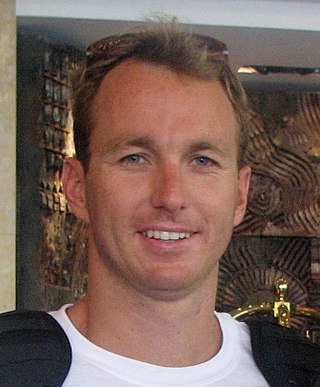
The men's 200 metre backstroke event at the 2004 Olympic Games was contested at the Olympic Aquatic Centre of the Athens Olympic Sports Complex in Athens, Greece on August 18 and 19. There were 36 competitors from 30 nations. Each nation had been limited to two swimmers in the event since 1984.

The men's 200 metre freestyle was a sprint swimming event in the Swimming at the 1900 Summer Olympics program in Paris. It was the shortest of the three freestyle events. It was held on 11 August and 12 August 1900. 26 swimmers from 10 nations competed. The event was won by Frederick Lane of Australia, with Zoltán Halmay of Hungary earning silver and Karl Ruberl of Austria earning bronze.

The men's 200 metre obstacle event was an obstacle swimming event in the 1900 Summer Olympics held in Paris. It was held on 11 August and 12 August 1900. Twelve swimmers from five nations competed. The event was won by Frederick Lane of Australia, with Otto Wahle of Austria second and Peter Kemp of Great Britain third. Lane had already won the 200 metre freestyle.
The men's 100 metre backstroke was one of six swimming events on the swimming at the 1908 Summer Olympics programme. It was the only backstroke event on the schedule. It was the first appearance of the event, after a 100-yard event was held in 1904. The competition was held on Thursday July 16, 1908 and on Friday July 17, 1908.
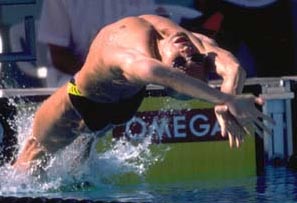
The men's 200 metre backstroke event at the 1992 Summer Olympics took place on 28 July at the Piscines Bernat Picornell in Barcelona, Spain. There were 44 competitors from 34 nations. Each nation had been limited to two swimmers in the event since 1984. The event was won by Martín López-Zubero of Spain. Vladimir Selkov of the Unified Team took silver, while Stefano Battistelli of Italy earned bronze. It was the first medal in the men's 200 metre backstroke for each nation.

The men's 200 metre backstroke event at the 1996 Summer Olympics took place on 26 July at the Georgia Tech Campus Recreation Center in Atlanta, United States. There were 39 competitors from 33 nations. Each nation had been limited to two swimmers in the event since 1984. The event was won by Brad Bridgewater of the United States, with his countryman Tripp Schwenk taking silver. It was the first time since 1980 that one nation had two swimmers on the podium in the event. Bridgewater's victory was the United States' first in the event since 1984 and fourth overall. Italy earned its second consecutive bronze medal in the men's 200 metre backstroke, with Emanuele Merisi taking the honours this time.

The men's 200 metre backstroke event at the 2000 Summer Olympics took place on 20–21 September at the Sydney Olympic Park Aquatic Centre in Sydney, Australia. There were 45 competitors from 38 nations. Each nation had been limited to two swimmers in the event since 1984. The event was won by Lenny Krayzelburg of the United States, with his countryman Aaron Peirsol taking silver. It was the second consecutive Games that Americans had finished one-two in the event. Bronze went to Matt Welsh of Australia, the nation's first medal in the event since 1980.

The men's 200 metre backstroke event at the 1984 Summer Olympics was held in the Uytengsu Aquatics Center in Los Angeles on July 31, 1984. There were 34 competitors from 25 nations, with each nation limited to two swimmers. The event was won by Rick Carey of the United States, the nation's third victory in the men's 200 metre backstroke. Frédéric Delcourt of France took silver and Cameron Henning of Canada earned bronze; it was the first medal in the event for each of those two nations.
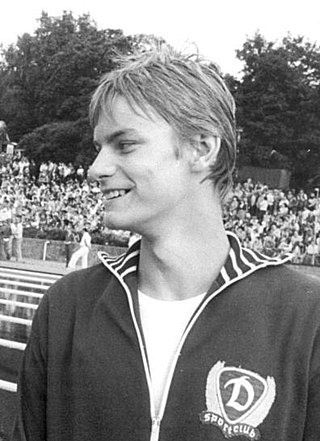
The men's 100 metre freestyle event at the 1980 Summer Olympics was held on 26 and 27 July at the Swimming Pool at the Olimpiysky Sports Complex. There were 39 competitors from 26 nations. Nations had been limited to three swimmers each since the 1924 Games. The event was won by Jörg Woithe of East Germany, the nation's first medal in the men's 100 metre freestyle. Sweden earned its first medals in the event since 1952 with Per Holmertz's silver and Per Johansson's bronze.

The men's 200 metre backstroke event at the 2008 Olympic Games took place on 13–15 August at the Beijing National Aquatics Center in Beijing, China. There were 40 competitors from 31 nations.
The men's 100 metre backstroke was a swimming event held as part of the swimming at the 1932 Summer Olympics programme. It was the sixth appearance of the event, which was established in 1908. The competition was held from Wednesday August 10, 1932 to Friday August 12, 1932.

The men's 100 metre freestyle event at the 1956 Olympic Games took place between 29 and 30 November. There were 34 competitors from 19 nations. Nations had been limited to three swimmers each since the 1924 Games. The event was won by Jon Henricks of Australia, the nation's first medal in the event. Australia would win a second 0.4 seconds later and a third 0.9 seconds after that, sweeping the podium—the first sweep in the men's 100 metre freestyle since the United States did it in 1920 and 1924, and the first sweep of any event by Australian competitors. This year, the Americans finished fourth through sixth. It was the first time since 1924 that Japan had competed but not medaled.

The men's 100 metre freestyle event at the 1960 Olympic Games took place between August 26 and 27. There were 51 competitors from 34 nations. Nations were limited to two swimmers each, down from three in previous Games. The event was won by John Devitt of Australia over Lance Larson of the United States in a controversial, disputed finish that resulted in a push for electronic timing. It was Australia's second consecutive victory in the event, third-most all-time behind the United States' 7 gold medals and Hungary's 3. Devitt, silver medalist four years earlier, was the fifth man to win multiple medals in the event. Manuel dos Santos earned Brazil's first medal in the men's 100 metre freestyle with his bronze.

The men's 100 metre freestyle event at the 1964 Olympic Games took place between October 11 and 12. There were 66 competitors from 33 nations. Nations were again able to bring up to three swimmers each after a one-Games limit of two in 1960. The event was won by Don Schollander of the United States, the nation's first victory in the event since 1952 and eighth overall. Great Britain and the United Team of Germany both earned their first medal in the men's 100 metre freestyle.
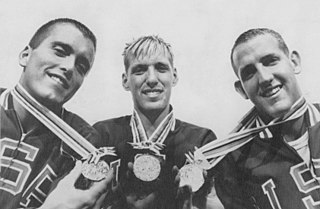
The men's 200 metre backstroke event at the 1964 Summer Olympics took place between October 11 and 13. There were 34 competitors from 21 nations, with each nation having up to 3 swimmers. The medals were swept by the United States, with Jed Graef, Gary Dilley, and Bob Bennett taking gold, silver, and bronze respectively.

The men's 100 metre freestyle event at the 1968 Olympic Games took place between 18 and 19 October. There were 64 competitors from 34 nations. Nations had been limited to three swimmers each since the 1924 Games. The event was won by Michael Wenden of Australia, the nation's third victory in four Games. Americans Ken Walsh and Mark Spitz took silver and bronze, respectively.
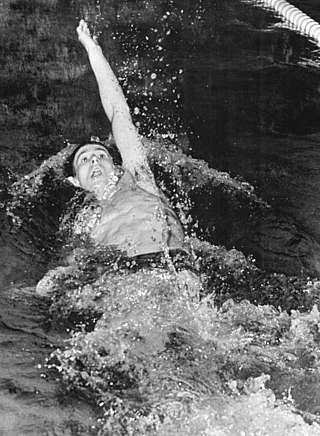
The men's 200 metre backstroke event at the 1968 Summer Olympics took place on 25 October at the Alberca Olímpica Francisco Márquez. There were 30 competitors from 21 nations, with each nation having up to three swimmers. The event was won by Roland Matthes of East Germany, the second gold medal for a German swimmer after Ernst Hoppenberg won in 1900. Matthes completed the backstroke double in the first Games both events were held, with Olympic record times in both. The United States, which had swept the podium in 1964, finished in the next three places behind Matthes: Mitch Ivey took silver, Jack Horsley bronze, and Gary Hall Sr. 4th.
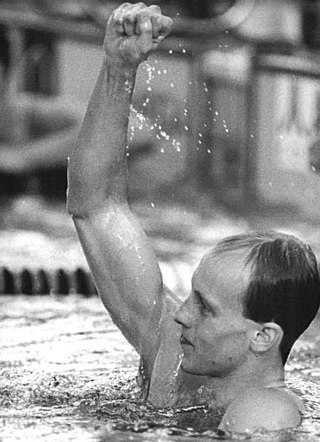
The men's 200 metre backstroke event at the 1988 Summer Olympics took place on 22 September at the Jamsil Indoor Swimming Pool in Seoul, South Korea. There were 44 competitors from 32 nations. Each nation had been limited to two swimmers in the event since 1984. The event was won by Igor Polyansky of the Soviet Union. Frank Baltrusch of East Germany took silver, while Paul Kingsman of New Zealand earned bronze. The medals were the first in the men's 200 metre backstroke for the Soviet Union and New Zealand; East Germany had not medaled in the event since Roland Matthes won gold in 1968 and 1972. For the first time, the United States competed and did not earn at least silver.

The men's 200 metre backstroke event at the 2012 Summer Olympics took place on 1–2 August at the London Aquatics Centre in London, United Kingdom. There were 35 competitors from 27 nations.

The men's 200 metre backstroke event at the 2016 Summer Olympics took place on 10–11 August at the Olympic Aquatics Stadium. There were 26 competitors from 19 nations.


















